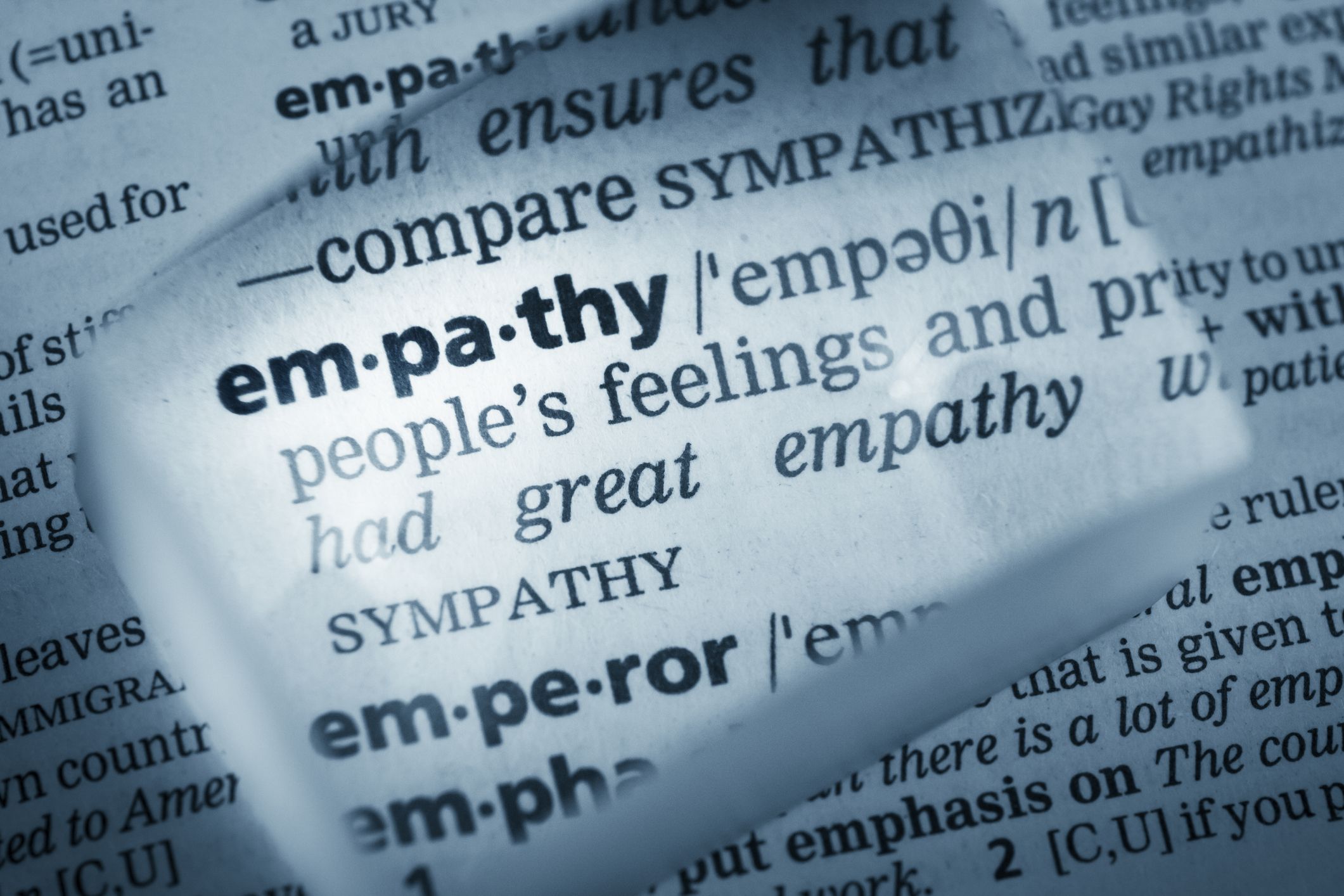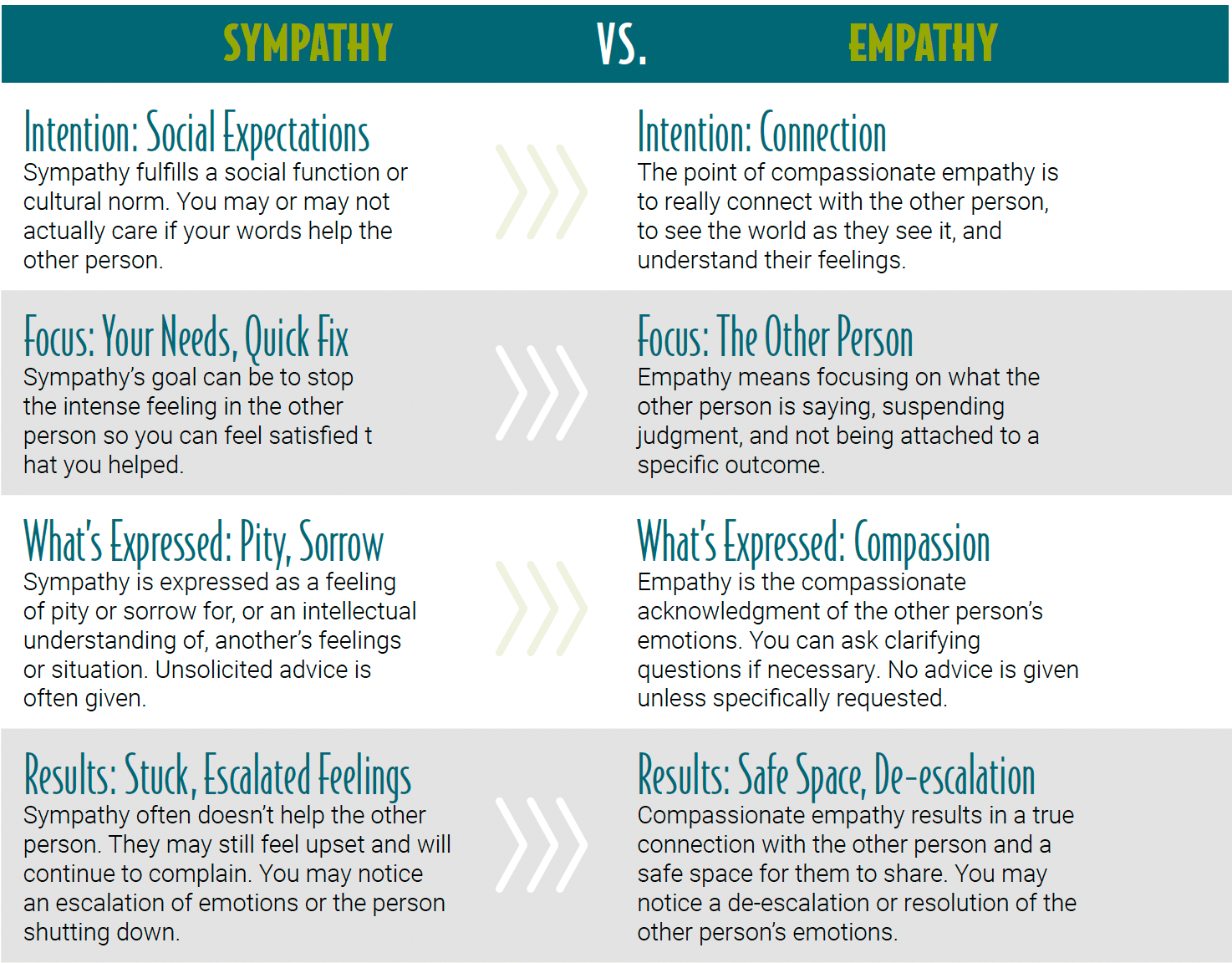You’d be forgiven for mistaking sympathy and empathy for synonyms. Much of pop culture and even many dictionaries confuse the two. On a basic level, they are similar. But in a very meaningful, practical way—empathy and sympathy are two separate practices and distinct emotional responses. We'll identify the difference between empathy and sympathy by exploring their roots and meanings.
Estimated reading time: 5 minutes

Sympathy Definition
There is a distinction, an important one. Look at the root of the words:
sympathy | ˈsimpəTHē |
noun
ORIGIN
late 16th century (in sympathy [sense 3]): via Latin from Greek sumpatheia, from sumpathēs, from sun- ‘with’ + pathos ‘feeling’.
Meaning: A common understanding between people; to feel pity or sorrow toward someone's misfortune.
Empathy Definition
empathy | ˈempəTHē |
noun
ORIGIN
early 20th century: from Greek empatheia (from em- ‘in’ + pathos ‘feeling’)
Meaning: The ability to understand and share the feelings of others.
These words look similar, and they are—but not the same. “With” is different than “in.” One implies togetherness and proximity, while the other implies oneness. The word “with” implies two people talking about the same thing; the word “in” is two people feeling the same thing. Very subtle but different.
Another way to envision this distinction: sympathy may be walking next to someone through hardship; empathy is understanding the hardship from their perspective and walking with them supportively. Sympathy is feeling sorry for a person begging for change, even relieved that it’s not you on the street. Empathy is understanding the discomfort of their situation and how it feels, which invokes an action from the heart.
A Quick Empathy Quiz for You!
Your partner confides in you: “One of my vendors isn’t delivering on time and it’s causing major problems on the job. I don’t know if we’re going to be able to meet our deadline.”
Do any of these responses sound like something you’d respond with?
-
“You sure don’t want to use them on your next project!”
-
“Wow, that's totally unacceptable. I'd call them and give them a piece of my mind!“
-
"Aww... that's awful! I’m so sorry you're stressed.”
-
"Hey, don't sweat it! It will work out."
-
“Wow, that sounds nerve-wracking! Are you concerned about letting down your clients?"
These are just a few of the many, many possible responses. They represent common reactions when another person shares some difficulty in their life, including fixing, judging, pitying, minimizing, and, finally, empathy.
Why the Distinction Matters between Sympathy and Empathy
The ability to feel another person’s emotions is not a luxury; it is a necessity.
Along with our most basic needs, human interaction is vital for survival. Beyond the social and life skills we learn from interacting with others, think back through human history to why we can empathize. Human survival at its most primal—the ability to stay alive—has always depended on our ability to collaborate, understand another person’s intentions, and communicate. From escaping predators and establishing trade to technological discoveries, both sympathy and empathy lie at the heart of some of the most integral human experiences.
Even if people don’t know the distinction, they are affected by it. Your challenges may be with your teenager, or your problem may be a coworker’s gossip and backbiting. The idea is the same: choosing effectively between sympathy and empathy can make or break situations in your daily life. The choice can determine whether understanding is reached or not and whether the relationship grows or not.
Here are some questions to consider:
- Do you want to feel fulfilled in your relationships?
- Do you want to establish meaningful connections at home and work?
- Do your interpersonal interactions matter in your everyday life?
- Do you want to feel confident in helping others feel heard, especially those you love?
- What about helping people feel accepted instead of judged?
Of course, empathy is not the only way to address these questions. But it is a powerful tool in establishing thriving relationships, fulfilling communications, and helping you achieve a happy lifestyle.
Related reading: "How to Talk to Someone with Empathy—and What to Avoid!"
What Is Sympathy?
It’s common for people to think they’re empathizing when they’re sympathizing or using feeling stoppers. We should be clear here—sympathy is not “bad” or “wrong.” Sympathy is valid and natural in many situations, but here is the crux: sympathy does not create resolution nor genuine connection and understanding.
Sympathy is a feeling of pity, sorrow for someone else’s pain or misfortune, or an interpretation of another person’s emotions or thoughts. On an emotional level, sympathy is usually only a superficial understanding of the other person. One study showed that sympathy was considered "an unwanted, pity-based response to a distressing situation, characterized by a lack of understanding and self-preservation of the observer."
How does seeing another’s misfortune make you feel? Sad? Annoyed? Angry?
Sympathy is how you feel when your body and brain come up against another person’s loss and emotional trauma or mental or physical misfortune. It is rooted in you and your feelings. Hence the definition “with.” You are feeling beside someone else, distinctly separate from them.
What Is Empathy?
Empathy, relative to sympathy, is much more a felt thing. Feelings can often be perceived as messy, irrational, weak, or overwhelming, so it’s understandable that empathy is the least practiced of the two.
The basic definition of empathy is the ability to understand and share the feelings of another. It’s right there in the description: “the feelings of another.”
Being empathetic has, at its core, emotions. Honestly, that right there is enough to scare a majority of the population away from looking any further into empathy. Let alone actively practicing it. Empathy falls right into the middle of a feelings stew.
Empathy is to put oneself from an inside perspective of another person’s mind, emotions, and body. It is to feel and understand another’s feelings without reacting inside yourself or taking on the emotion. For example, in an empathetic interchange, you wouldn’t walk away feeling worse. The person’s experience is theirs, not yours.
Empathy Quote
To empathize means to create a safe, nurturing space that helps the person process their experience and integrate their emotions so they are better equipped to take illumined action. And an added bonus: they don’t feel alone but connected and supported.
Related reading: "The Three Kinds of Empathy: Emotional, Cognitive and Compassionate"
To Sympathize or to Empathize?
Sympathy is rooted in being alongside someone else in their misfortune.
Empathy is rooted in feeling the emotions of someone you interact with.
Yes, empathy is more complex. You must be confident enough in your own sense of self to set aside your opinions and feelings to truly relate and step into another’s perspective. It requires setting aside your desire or needs to fix things. It means stilling the thoughts undoubtedly swirling around your mind to understand another person not just on a rational level but on an emotional level. Empathy also takes practice because every situation and person is different, requiring active work rather than rote responses.
And empathy will connect you more deeply to the ones you care about. It will allow others to work through their own emotions rather than blocking or escalating them, which leads to healing. When done well, empathizing will establish open communication and resonance between people.
Sympathy is…
To put yourself alongside another in their struggles.
Empathy is…
To put yourself inside the human, feeling experience and perspective of another.
To sympathize or empathize ... it's up to you! Hands down, though, empathy is the more compassionate way and will dramatically increase the quality of your life and relationships when mastered.
If you're ready to learn empathy skills and get a step-by-step guide for empathizing with practice, try our mini-workbook, Real Empathy, Real Solutions: 4 Keys to Unlocking the Power of Empathy.
To learn more about emotional intelligence, please check out Heartmanity's resources.









